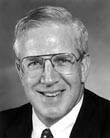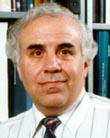2005 Weiss Presidential Fellows named for outstanding teaching
By Susan S. Lang



Three Cornell faculty members have been chosen for the 2005 Stephen H. Weiss Presidential Fellowships for effective, inspiring and distinguished teaching of undergraduate students. They are Ronald Ehrenberg, the Irving M. Ives Professor of Industrial and Labor Relations and Economics; Anthony Ingraffea, the Dwight C. Baum Professor of Engineering in the School of Civil and Environmental Engineering; and Paul Sherman, professor of neurobiology and behavior.
The awards -- $5,000 a year for five years for each faculty member -- are named for Stephen H. Weiss '57, emeritus chair of the Cornell Board of Trustees, who endowed the program. They recognize excellence in teaching, advising and outstanding efforts toward instructional improvement and development. The appointed fellows are permitted to hold the title of Weiss fellow simultaneously with any other named professorship.
The three faculty members will be honored at a luncheon Nov. 10 and also at an awards dinner in March 2006, when the board of trustees is on campus.
Ehrenberg, who joined the Cornell faculty in 1975 and has been the director of the Cornell Higher Education Research Institute since 1998, has also served as director of the Institute for Labor Market Policies at the School of Industrial and Labor Relations (ILR) and as Cornell's vice president for academic programs, planning and budgeting (1995-98). Having taught a range of courses in labor economics over 30 years, Ehrenberg consistently receives high marks from his students who write that he stands out as a teacher, is unusually accessible and that they appreciate his emphasis on assigning original research papers, which gives students the opportunity to become actively involved in designing research projects, collecting and analyzing data and interpreting results. Students are particularly impressed with Ehrenberg's down-to-earth, fatherly way of interacting with them and his willingness to serve as a "life mentor" when needed during crises. He is not only considered an excellent classroom teacher but also a dedicated and compassionate academic as well as a leader in undergraduate research that has produced outstanding outcomes. The author or co-author of over 100 papers and 15 books on labor economics and the economics of higher education, Ehrenberg is also the recipient of the 2003 General Mills Foundation Award for Exemplary Undergraduate Teaching from the ILR School.
Ingraffea, who has been teaching structural mechanics, finite element methods and fracture mechanics at Cornell since 1977, is also the director of the Cornell Fracture Group. Because he is known as an inspiring and effective educator, he has been repeatedly called upon to teach an introduction to engineering course and a key sophomore-level course. His students consistently praise his courses as among the most enlightening, provocative and insightful classes they have taken. He makes allowances for different learning styles and continuously and voluntarily serves as a mentor for many students and faculty as well as a supervisor to numerous undergraduate research students. Students readily appreciate his advice, encouragement, enthusiasm and inspiration. Ingraffea has received numerous awards for his outstanding teaching at Cornell, including the 1997 Society of Women Engineer's Professor of the Year Award and the 2001 Daniel Luzar '29 Excellence in Teaching Award and the J.P. and Mary Barger '50 Excellence in Teaching Award, both from the College of Engineering.
Sherman, a member of the faculty since 1981, teaches animal behavior, behavioral ecology and Darwinian medicine. He consistently receives the highest possible rating from his students who write that he has an amazing talent for teaching. They praise his lectures for his enthusiasm, for his logical and clear thinking and for his command of language, all of which give him an unusual ability to make complicated concepts clear, compelling and even exciting. His high energy level, patience, humor and dedication to enhancing the learning experience as well as his highly effective writing and his key role in the Knight Institute for Writing in the Disciplines have prompted some students to say that his course is the best one they have ever taken. He has published 180 technical papers and five books, as well as three books for children. Among his many awards are the Clark Award for distinguished contributions to undergraduate teaching from the College of Arts and Sciences and his appointment as a Sigma Xi Distinguished National Lecturer, 2004-06.
In recognition of the importance of undergraduate teaching, the Cornell Board of Trustees established the Stephen H. Weiss Presidential Fellowships in 1992. Academic staff and junior and senior students are invited to nominate tenured faculty members. Each year, the president appoints three previous winners and three emeritus professors to the Weiss Fellows Committee. They review the student nominations from Cornell's various colleges and appoint three undergraduate students to the committee. The nine-member nominating committee then reviews all the nominations for outstanding faculty and forwards recommendations to the president, who ultimately makes the final decision. This year, the call for nominations for the 2006 Weiss fellows will go out in late January 2006, with a nomination deadline of March 8, 2006.
To date, 40 faculty members have been named Weiss fellows.
'Words of Wisdom'
To inspire Cornell faculty members to influence students beyond the formal classroom setting, help students in any of a variety of ways and to encourage them to make a distinctive contribution to undergraduate teaching, the three 2004 Weiss Fellows were asked to write short essays about their ideas and approaches to teaching. The result is "Words of Wisdom: 2004 Weiss Fellows," by T. Michael Duncan, chemical and biomolecular engineering; C. Richard Johnson Jr., electrical and computer engineering; and Peter J. Katzenstein, government. The 11-page booklet will be sent to all Cornell faculty members this month.
"For anyone who believes that outstanding teachers are born not made, the 'Words of Wisdom' from Cornell's 2004 Weiss Fellows will come as a welcome surprise," said President Hunter Rawlings. "These world-class Cornell professors have thought deeply about what they want to accomplish through their teaching, and in these brief essays they describe, in detail, how they achieve their remarkable results. As someone who will soon return to the classroom full time, I find their essays reassuring and inspiring."
Media Contact
Get Cornell news delivered right to your inbox.
Subscribe